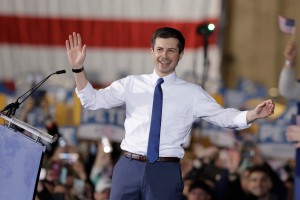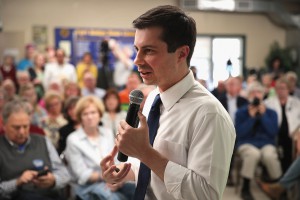Washington, D.C., May 5 – “Will you be putting people with disabilities in your campaign ads and will you be putting them on your staff?” asked Jennifer Laszlo Mizrahi, the President of RespectAbility. To which, presidential hopeful Mayor Pete Buttigieg replied, “Yes,” during a campaign stop in the nation’s capital on April 4, making him and Beto O’Rourke the only two presidential candidates to make such a campaign promise on the record.
And by the end of the month, Buttigieg had kept his promise by hiring Emily Voorde, a wheelchair-user, to work for his campaign. This occurred only days after sending a video message using American Sign Language to a deaf supporter to thank him for his support. By quickly keeping this campaign promise, Americans with disabilities have reason to hope that Buttigieg’s campaign will have people with disabilities in mind.

Buttigieg, also known as “Mayor Pete,” is unlike any of his adversaries or any other former president. He is a 37-year-old, openly gay millennial from South Bend, Indiana, who speaks at least seven languages, graduated with honors from Harvard and served in the Navy. In 2012, he became the Mayor of South Bend, a small midwestern industrial town, struggling to stay afloat. Buttigieg has received great credit and esteem for his work in turning around this Rust Belt city. He ran a failed bid for the presidency of the Democratic National Committee (DNC) in 2017 and later announced his campaign for president of the United States earlier this year.
“Pete for America” Must Have People with Disabilities in Mind
On January 22, 2019, Buttigieg made his presidential announcement through an official announcement video, which he posted on Twitter and other social media networks. His video communicated a campaign that denounces the idea of greatness being from our past, an obvious jab at President Donald Trump’s 2016 “Make America Great Again” slogan. And on April 15, 2019, he made his official announcement speech to a crowd of supporters in his hometown of South Bend, Indiana, which was broadcast live on all major networks.
People with disabilities comprise 20 percent of our country’s population (and 25 percent of adults in America), and more than half of Americans have a loved one with a disability. A recent survey shows that fully three-quarters of likely voters either have a disability themselves or have a family member or a close friend with disabilities. Thus, for a presidential candidate to represent all Americans, he must include people with disabilities.
Buttigieg’s campaign promise to hire people with disabilities is such an incredible and novel campaign promise that when his adversary, Beto O’Rourke, made the same promise days before, it was reported by news publications across the country, including the New York Times and the Washington Post. With 74 percent of U.S. voters having a loved one with a disability, hiring people with disabilities to hold leadership positions in campaigns should not be so rare. Yet, O’Rourke is the only other 2020 candidate to have made a similar public pledge. And, Mayor Pete is the first presidential candidate to have hired a staffer with a disability.
“The unfortunate fact is that stigma is still a driving factor in why two-thirds of people with disabilities are unemployed,” said RespectAbility’s Vice President, Communications, Lauren Appelbaum, who leads the organization’s nonpartisan political outreach efforts. “There is no better way to disprove the idea that people with disabilities are not able to work than by hiring them to ultimately work for the highest office in the land.”
In order to be fully inclusive, announcement videos, website and social media should include accurate and descriptive captioning, as well as mention and depict people with disabilities. Buttigieg’s announcement video included accurate open captioning, and was just one of a few 2020 presidential announcement videos to do so. However, he failed to mention or depict people with disabilities, even though he depicted an otherwise diverse group of people. His recent video message in ASL and the hiring of Emily Voorde show that Buttigieg is learning and adapting to ensure he is being welcoming and fully accessible for all.
Voter research conducted by RespectAbility shows how disability issues connect to all aspects of American life. It is in the best interest of every presidential candidate and the citizens of this country for candidates to recognize disability issues during their campaigns.
“Candidates for office ignore the disability community at their peril,” said former U.S. Representative and Dallas Mayor Steve Bartlett. Bartlett, who was a primary author of the Americans With Disabilities Act of 1990, is the board chair of RespectAbility. “People with disabilities are politically active swing voters, and candidates should take note of the important issues they care about.”

Buttigieg is gaining increasing name recognition through a tremendous amount of press coverage. He is raising impressive amounts of money. His commitment to hiring and campaigning to people with disabilities sends a strong message to the disability community that he wants their vote and their input. If he provides a fully disability inclusive campaign and shows his commitment to disability issues, he could very well capture a major swing vote and the largest minority in the country – people with disabilities. In doing so, he could be the dark horse who makes history by becoming the youngest and first openly gay president of the United States.
[…] Mayor Pete Buttigieg Delivers on Pledge to Include People with Disabilities in His Campaign, Including in Hiring Practices […]
Glad to see this evaluation of Pete Buttigieg’s campaign. I’ve put in a resume and hope to hear from the campaign when they come around to hiring in NYC.
[…] engage voters with disabilities is by hiring disabled staff. Gillibrand, Beto O’Rourke, and Mayor Pete Buttigieg have all publicly pledged to hire staff with disabilities in either their campaigns or potential […]
I’d also point to this account by one of the Buttigieg staffers, Andy Pleasants, who’s also done a fun/silly video about campaign emails. He has Goldenhar Syndrome, which he explained in some of his tweets. https://twitter.com/andyispleasants
[…] Gillibrand promised to put a person with disabilities in her Cabinet and Mayor Pete Buttigieg hired a staffer who uses a […]